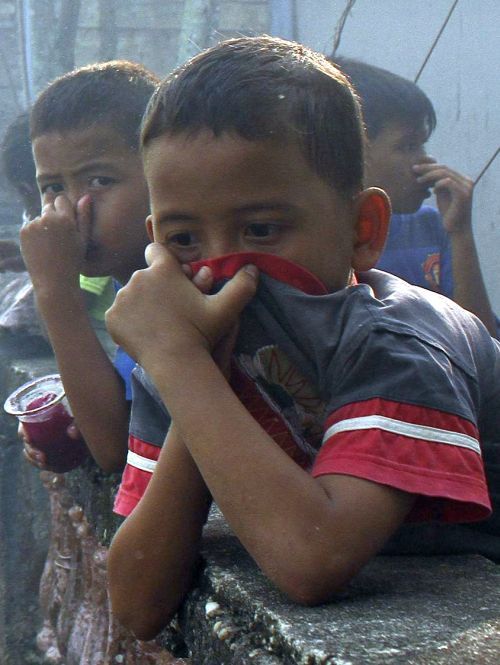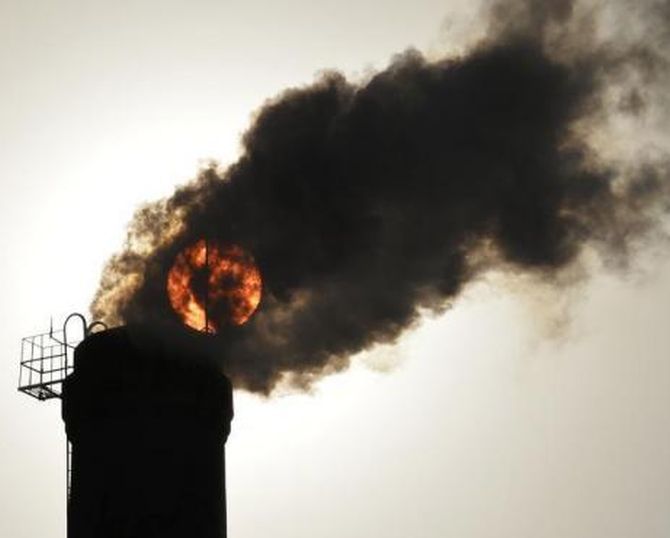
We know enough to act against pollution.
We need to enforce compliance.
No delays. Not anymore.
It is literally a matter of life and death. Ours, says Sunita Narain.
Each winter, without fail, we are seemingly caught unawares.
Media and government alike ask in wondrous amazement, why the smog?
We continue to do this even as each year things are getting worse, not better, in Delhi.
In the winter of 2014-15, some 34 per cent of the days were categorised as “severe” in terms of air pollution, which by the government’s own index means that there is a health hazard, not just for the vulnerable, but for all.
The following year, 2015-16, some 68 per cent of the winter days hit the “severe” category.
This year, 2016-17, winter has just begun and we are already reeling under a public health emergency.
This is when we know that everything has to be done -- some actions have long gestation periods and some have drastic immediate action. In all cases, we should be checking what is being done and ensure we stick to the deadline. But this is too much to do -- the automobile industry blames dust; the Delhi government blames farmers for burning crop; somebody blames somebody else for burning garbage and so nothing really gets done.
So, it is time we stopped looking for excuses not to act. The sources of pollution and the action to be taken are known. But what is needed is to act. Plain and simple. Obviously, we will learn more, and can do more, as we get more information, but our eyes need to be firmly on the ball -- we must get results. So, focus, on each source and each action; who has to do what and by when. And, for once, let's set aside all reasons to prevaricate and obfuscate, and agree that we know enough to act.
We also have all the necessary directions from the government or judiciary but we need to enforce compliance.
No delays. Not anymore.
It is literally a matter of life and death. Ours.
We know that combustion in vehicles, industry and thermal power plants and garbage is a key cause of pollution. Dust is an important source and its control requires enforcement and movement of vehicles on roads which adds to its re-circulation.
These sources are known in Delhi, across India and across the world. What is needed is to improve the quality of fuel; vehicular emission technology and make mobility transitions so that we can reduce the sheer numbers (which translates) into pollution on our roads.
We also need to ensure that we manage our garbage in ways that we can segregate it at homes and compost it and process it. We cannot burn it. No rocket science here.
But India’s tryst with air pollution control has always been contested and never been easy. For instance, take the issue of advancement of vehicular emission and fuel standards. In 1999, it took the Supreme Court to drive down the deadline -- against the wills and wishes of automobile companies. Their battery of lawyers told the court it was unnecessary; inconvenient and un-impactful (ring any bells?). It happened. It helped to reduce emissions across cities.
In October 2016, the Union government had notified it would bring in BS-VI norms by 2020. This is an advancement over what was earlier scheduled to happen in 2024 and is happening against the wills and wishes, once again, of the automobile companies. This will be a game changer, but it will take time.
In the meantime, BS-IV fuel (with 50 ppm of sulphur as against 350 ppm in BS-III) will be available nationwide by April 1, 2017. This is also important because we know that between BS-III and BS-IV technology, particulate emissions are reduced by some 80 per cent. Once this fuel is available, then retrofitting old vehicles or even scrapping commercial vehicles can be incentivised. Also, by April 1, 2017, all two-wheelers will have to meet BS-IV norms, which are significantly tighter.
But already, we are learning that industry is not prepared to move all its buses and trucks to BS-IV by April. Why? It says it has huge inventories and this means it will take another six-eight months to make this move. The two-wheeler manufacturers, who were given one full year to make the transition to cleaner technology, say they are trying their best but again, have huge inventories to sell. So, deadlines to bring new cleaner vehicles must be shifted, they say. Unacceptable we must say.
I could go on with the list. But enough is enough, is what we must say in unison. Today the only folks who are benefitting from dirty and toxic air are companies that manufacture masks and air-purifiers. It should dismay us that these companies are sponsoring programmes on hazards of air pollution — this is not the future we want for us or our children. This is what we must say loudly and every month — not just in winter. Then action will happen. Clean air will happen.
Sunita Narain is director general of the Centre for Science and Environment.
Photographs: Reuters.












 © 2025
© 2025